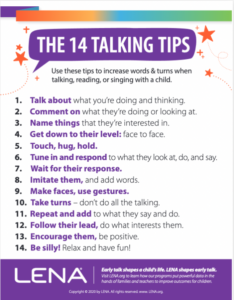 This week’s resource, The 14 Talking Tips, comes from LENA.org, “a national nonprofit on a mission to transform children’s futures through early talk technology and data-driven programs.” Available in both English and Spanish (in the same file, no less), The 14 Talking Tips encourages families “to increase words and turns when talking, reading, or singing” with their young children by implementing these simple strategies. These ideas work great for infants and toddlers with and without disabilities, in any language, including sign language. And we know how much everybody loves a one-pager, perfect for sticking up on the fridge as a regular reminder to comment, name things, wait with anticipation, and a host of other ideas.
This week’s resource, The 14 Talking Tips, comes from LENA.org, “a national nonprofit on a mission to transform children’s futures through early talk technology and data-driven programs.” Available in both English and Spanish (in the same file, no less), The 14 Talking Tips encourages families “to increase words and turns when talking, reading, or singing” with their young children by implementing these simple strategies. These ideas work great for infants and toddlers with and without disabilities, in any language, including sign language. And we know how much everybody loves a one-pager, perfect for sticking up on the fridge as a regular reminder to comment, name things, wait with anticipation, and a host of other ideas.
The ICC-Recommended Early Start Personnel Manual (ESPM) describes core knowledge and role-specific competencies needed for early intervention service provision, incorporating current research and evidence in the field of early intervention. To access the ESPM, click here.
This resource is related to the following ESPM knowledge-level competencies:
-
Individualized Family Service Plan Development and Review (IFSP-DR):
-
IFSP-DR5 (EIS): Understands the rationale for the identification and selection of intervention strategies used in everyday routines, relationships, activities, places, and partnerships for early intervention activities.
-
Individualized Family Service Plan Development and Review (IFSP-i):
-
IFSP-i3 (EIS): Knows generic and specific evidence-based early intervention strategies to support all areas of development.
-
IFSP-i4 (EIS): Understands early experiences that contribute to emergent literacy.
-
IFSP-i5 (EIS): Understands issues related to English language learning and maintenance of home language.
-
IFSP-i6 (EIS): Understands the need for developmentally appropriate strategies (for example, hands-on, experiential, child-centered, play-based activities within daily routines), adaptations, assistive technologies, and other supports that maximize the child’s learning opportunities.
-
IFSP-i11 (EIS): Knows strategies that support parents in adapting the natural environment to meet infant/toddler developmental needs.
-
IFSP-i13 (EIS): Understands the importance of bilingual/bicultural staff members, service providers, and community resources and their role on the team.
Don’t miss out. Get the latest articles and resources in our monthly newsletter.
SUBSCRIBE
 This week’s resource, The 14 Talking Tips, comes from LENA.org, “a national nonprofit on a mission to transform children’s futures through early talk technology and data-driven programs.” Available in both English and Spanish (in the same file, no less), The 14 Talking Tips encourages families “to increase words and turns when talking, reading, or singing” with their young children by implementing these simple strategies. These ideas work great for infants and toddlers with and without disabilities, in any language, including sign language. And we know how much everybody loves a one-pager, perfect for sticking up on the fridge as a regular reminder to comment, name things, wait with anticipation, and a host of other ideas.
This week’s resource, The 14 Talking Tips, comes from LENA.org, “a national nonprofit on a mission to transform children’s futures through early talk technology and data-driven programs.” Available in both English and Spanish (in the same file, no less), The 14 Talking Tips encourages families “to increase words and turns when talking, reading, or singing” with their young children by implementing these simple strategies. These ideas work great for infants and toddlers with and without disabilities, in any language, including sign language. And we know how much everybody loves a one-pager, perfect for sticking up on the fridge as a regular reminder to comment, name things, wait with anticipation, and a host of other ideas.